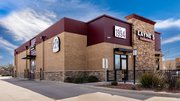News
Net zero energy is possible for McDonald's, study says
A study by Rocky Mountain Institute, Fisher Nickel Inc. and New Buildings Institute seeks to help McDonald’s Corporation understand whether it would be feasible to develop a net zero energy quick service restaurant.
February 3, 2015
A study by Rocky Mountain Institute, Fisher Nickel Inc. and New Buildings Institute seeks to help McDonald’s Corporation understand whether it would be feasible to develop a net zero energy quick service restaurant, according to a press release. The study’s research, technical analyses and recommendations, provide a blueprint for McDonald's to pursue future net zero energy restaurants and select energy efficient solutions for existing restaurants.
"The study demonstrates that for high energy intensity building types, such as restaurants, every single piece of energy-using equipment must be examined as part of a system. There's plentiful opportunity to optimize and reduce energy use without compromising the consistency and quality of the end products," said Stephen Doig of Rocky Mountain Institute in the release. "To get to net zero energy, we reviewed the real-time energy use of equipment and developed system synergies to dramatically improve energy efficiency in kitchen equipment and HVAC systems."
Net zero energy is possible on a stand-alone traditional McDonald’s site, without any reductions to the menu or service, the announcement said.
Key findings:
- Reaching net zero begins with up to a 60 percent improvement in energy efficiency versus an already-efficient U.S. prototype restaurant design from 2013.
- Remaining energy needs could be met on the existing site area, with a 300 kW photovoltaic system primarily installed over the building and parking spaces.
- Energy efficiency combined with sufficient solar photovoltaics could significantly reduce energy costs to about only 5 to 15 percent of a U.S. restaurant’s current average energy cost.
- The additional capital cost to achieve a net zero energy restaurant in the U.S. was mainly associated with the integration of on-site photovoltaic systems.
As a result of the research, McDonald's has identified the following next steps:
- Explore recommended energy efficiency strategies, including research and development to improve kitchen equipment efficiencies in order to reduce overall NZE costs.
- Potentially design and build a pilot NZE restaurant in the future to act as a “learning lab” to test and validate new technologies.
- Find one or more vendors to design, deliver, and maintain large solar installations on standard McDonald’s sites, while securing incentives and potential financing.
- Engage with the restaurant industry and suppliers as appropriate to help drive improvements going-forward.
Net zero energy means that in a year, an energy efficient building (including the site) produces as much renewable energy as is consumed on-site, the release said.









